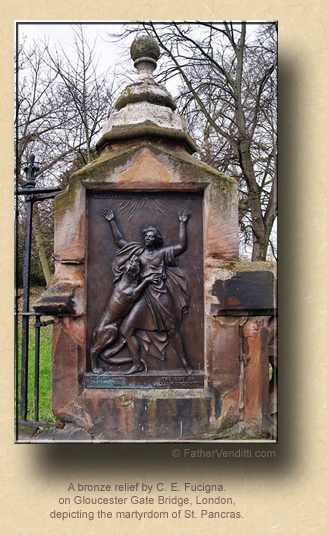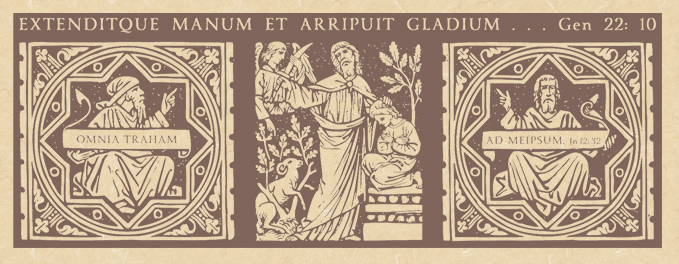Courage Is a Function of Faith.
The Sixth Tuesday of Easter; the Memorial of Saints Nereus & Achilleus, Martyrs; or, the Memorial of Saint Pancras, Martyr.
Lessons from the feria, according to the ordinary form of the Roman Rite:
• Acts 16: 22-34.
• Psalm 138: 1-3, 7-8.
• John 16: 5-11.
Rogation Tuesday;* and, the Third Class Feast of Saints Nereus, Achilleus, Dormitilla & Pancras, Martyrs.
Wisdom lesson from the common, Gospel lesson from the proper, according to the extraordinary form of the Roman Rite:
• Wisdom 5: 1-5.
• John 4: 46-53.**
The Feast of Our Holy Fathers Epiphanius, Bishop of Cyprus, & Germanus, Patriarch of Constantinople.
Lessons from the pentecostarion, according to the typicon of the Byzantine-Ruthenian Rite:
• Acts 17: 19-28.
• John 12: 19-36.
FatherVenditti.com
|
 10:39 AM 5/12/2015 — The account of how Paul and Silas were miraculously released from prison is, of course, a very fanciful one. Perhaps it is sufficient to simply reflect on the fact that, when the Philippian jailer thought they had escaped and was prepared to kill himself, and later found out that the Apostles had not taken advantage of the miraculous earthquake that shook off their chains, he was so grateful that he embraced the faith. But, think about it: so quick he was to kill himself because he so feared the wrath of his superiors; but, after receiving the gift of faith, suddenly that doesn't matter to him anymore. When he takes Paul and Silas to his own home, gives them a meal and sends them on their way, are his superiors going be less angry with him then they would be if they had simply escaped? Real faith does that: it takes away our fear of the consequences of embracing the Cross of Christ. 10:39 AM 5/12/2015 — The account of how Paul and Silas were miraculously released from prison is, of course, a very fanciful one. Perhaps it is sufficient to simply reflect on the fact that, when the Philippian jailer thought they had escaped and was prepared to kill himself, and later found out that the Apostles had not taken advantage of the miraculous earthquake that shook off their chains, he was so grateful that he embraced the faith. But, think about it: so quick he was to kill himself because he so feared the wrath of his superiors; but, after receiving the gift of faith, suddenly that doesn't matter to him anymore. When he takes Paul and Silas to his own home, gives them a meal and sends them on their way, are his superiors going be less angry with him then they would be if they had simply escaped? Real faith does that: it takes away our fear of the consequences of embracing the Cross of Christ.
Consider the short life of Saint Pancras, whose memorial we are observing today. In the old calendar, the martyred soldiers Nereus and Achilleus, who were killed when they left the army to embrace the faith, shared this feast with Pancras; in the new Missal, we have to choose between them. I choose to observe Saint Pancras because of how his remarkable story dovetails with today's Apostolic lesson. He was both converted and martyred at the age of fourteen. His crime, like most of the early Roman martyrs, was refusing to sacrifice to the Roman gods. Fourteen-year-olds are usually scared of not fitting in, and he had only been a Christian for a very short time when he was asked to choose between earthly life and heavenly life; but, faith does that: it takes away fear.
When we make our examination of conscience and reflect on how our response to this or that situation wasn't what it should have been—because it lacked charity or fortitude or gave in to going along with the crowd, or whatever—nine times out of ten we'll find that it's usually because we were unwilling to face the consequences of doing what, in the back of our minds, we knew was right all along. When we are in a group, and that group is speaking uncharitably about someone, we participate to fit in, and because we suspect that, if we don't, then next time they might be talking about us. Chances are they're probably talking about us anyway when we're not around. Or maybe we laugh at an immodest joke or go along with using profane language so no one thinks we're prudish.
These are all trivial things compared to the sacrifice of Saint Pancras, or of Saints Nereus and Achilleus, or of the brave jailer in Philippi who went from fearing the anger of his superiors to not giving them a second thought in just a matter of moments. But fear of the consequences of Christian living and Christian acting is rooted, not so much in a lack of fortitude, but in a lack of faith, just as courage in the face of temptation is grounded in a solid faith. In the collect of the Mass today for Saint Pancras, we prayed that the Church be confident in his intercession, persevere in devotion and stand firm; but, we can translate that to ourselves, and ask our Blessed Lord, with the prayers of His martyrs, to grant us the grace to be confident in His help, persevere in devotion to Him, and stand firm in the faith no matter what the cost.

* Earthquakes and other calamities afflicted the diocese of Vienne in Dauphiny (France) in the fifth century, and St. Mamertus, who was bishop there, instituted a penitential procession with public supplications on the Monday, Tuesday and Wednesday before Ascension Day. In 816, Pope Leo III introduced the practice at Rome, and it soon became observed throughout the whole Church, and known as the Rogation Days. Rogation Monday and Rogation Tuesday are ferias of the Fourth Class; but, as the Vigil of the Ascension, Rogation Wednesday is a feria of the Second Class. Thus, today, the Mass of Rogation Tuesday is displaced by the feast of the martyrs, but the procession nonetheless takes place; tomorrow, the Vigil of the Ascension displaces the Third Class Feast of St. Robert Bellarmine, which is observed as a commemoration.
The manner of making the procession is simplicity itself: prior to Holy Mass, the priest, wearing purple stole and cope (regardless of the color of the day), processes with the servers—and, if he so wishes, the people—around the church, singing the Litanty of the Saints as they go; Psalm 69 and the other prayers that accompany the Litany of the Saints in the Roman Breviary are also said. The procession ends at the foot of the Altar, where the priest changes into the proper vestments for Mass, and begins the usual prayers at the foot of the altar, the Mass continuing as normal. There is nothing in the rubrics that indicates that anything in particular is carried in this procession.
** In the extraordinary form of the Roman Rite, from Easter Saturday until the end of Paschaltide, the Gradual Psalm is omitted.
|

